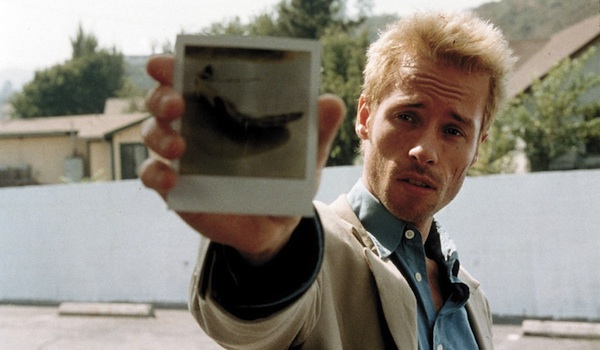Memento Review
It was the film that introduced us all to Christopher Nolan. But “Memento†is more noteworthy than that. It’s a sensational story of a damaged man and his backward quest for revenge. The film does so many things right, but its premise and style are unlike anything I’ve ever seen before. “Memento†tells the story of a man with no short-term memory, and the film unfolds in a way that makes us feel what he feels. The jumbled reverse chronology (mixed with a more linear story that it dovetails with near the conclusion) is fascinating to watch and brings a real sense of truth to the proceedings. And the ending is out of this world and never expected. It’s a triumph on so many levels and remains, despite all of his great successes, the venerable British director’s best film.
Leonard Shelby (a never-better Guy Pearce) is a bit odd, but he wasn’t always this way. One night, he is awoken to the sounds of his wife being raped and eventually murdered. He escapes the ordeal, but with some serious brain damage that renders him unable to make new memories. He remembers everything before the incident, but anything that happens afterward fades away after a few minutes. His life is run by repetition and order—he takes pictures of everything and records vital information on his body in the form of tattoos. And he lives for one simple purpose—kill John G (don’t worry, not this John G), the man responsible for his condition and the death of his wife.
The film simultaneously tells the story of Sammy Jankis (Stephen Tobolowsky). Sammy suffered from the same condition as Leonard a number of years before Leonard’s accident. Leonard was responsible for determining whether Sammy’s insurance claims will go through, and he became fascinated by him, going so far as to tattoo “Remember Sammy Jankis†on his hand. This storyline is tragic in its own right, but it reveals a lot about our main character, and the way it is reconciled with the main storyline is nothing short of shocking.
The way Nolan tells these stories is confusing at first. It definitely takes some getting used to, and even once you do, it’s not clear whether it’s completely necessary or more of a gimmick. But the conclusion (which really is as good as any film ending ever) shows how essential the story-telling method is. And seeing the way little things play out (like the way certain things are written on Leonard’s photos or the way he interacts with the man at the front desk of his hotel) infuses the film with some humor and adds a sense of mystery to almost everything that happens.
The film’s acting is exceptional. As I said, Guy Pearce has never been better. He’s sympathetic, but a little scary in his determination, and Pearce pulls it all off spectacularly. The two other main characters I haven’t discussed are Teddy (Joe Pantoliano) and Valerie (Carrie-Anne Moss). Teddy appears to be friends with Leonard, but there’s an animosity between them at times, and it often looks like Teddy is taking advantage of Leonard. Pantoliano plays Teddy as a bit of a creep, and he never makes us certain of his intentions. Valerie is a female companion of Leonard who, according to his photo of her, will help him out of pity. But we know she is not looking out for his best interests. The only question about her is how much her misinformation will harm him.
I’ll always remember “Memento†for giving us the tremendous talent that is Christopher Nolan. He’s one of the best working directors, and like James Cameron and Martin Scorsese, his films have become big events. It all started here, and while I hope he tops his work here one day, (he came close with “The Dark Knight”) I’m just not sure it’s possible. He is surprisingly sure of himself as a director considering how inexperienced he was. It was clearly a sign of things to come.
I admire this film for so many reasons. It’s unique, fascinating, complex, and very re-watchable. It’s definitely one of the best of the last decade.















